Saturday, March 30thThroughout the year, the Massachusetts Conference of the United Church of Christ produces the Daily Lectionary for use by churches. These are the suggested readings for March 30th: Exodus 32:7-14; Psalm 32; and Luke 15:1-10. I would encourage you to read these short selections as part of your Lenten practice.
I don’t know any shepherds. You could tell me just about anything about shepherding and I would be gullible. Jesus, on the other hand, was speaking to people who definitely knew about shepherding or were possibly shepherds themselves. In that case, Jesus couldn’t get away with saying something that didn’t make sense. With this in mind, consider the details of Jesus’ parable of the one lost sheep. The shepherd leaves the 99 “in the wilderness.” The 99 are left unattended. They're not penned-in somewhere safe. They are left "in the wilderness." In such a case, they can scatter, and they are susceptible to predators. Still, the shepherd leaves the 99 to search for the one. This is illogical to me who knows nothing about shepherding. It must have been absolutely farcical to the actual shepherds listening to Jesus. This had to be His intent. Jesus is making the point of how illogical God’s love is. As we will talk about tomorrow in church, God’s love, Christ’s love, is unconditional. It is not dependent on logic. It is dependent on the nature of God. “For my thoughts are not your thoughts, nor are your ways my ways, says the Lord. For as the heavens are higher than the earth, so are my ways higher than your ways and my thoughts than your thoughts,” reveals the Lord to His prophet. (Isa. 55:8-9) Jesus seems to be saying that it’s the whole that matters. The one is just as important as the 99, not as in less than or more than, but because all that matters is the whole. The shepherd cannot accept the loss of any of the sheep. The illogical nature of this action would have been recognized immediately by the people of Jesus’ day and that would have seized their attention, would have started them thinking about what could this Galilean carpenter be talking about? And as soon as they start to think, Jesus has His opening. Jesus can try to persuade them to move past the illogical so that they may consider the revelation of the nature of God’s illogical, unconditional love. The message of the one lost sheep may be hard to accept, but God’s thoughts are not ours, and it’s not God whose mind we should expect to change.
0 Comments
Friday, March 29thThroughout the year, the Massachusetts Conference of the United Church of Christ produces the Daily Lectionary for use by churches. These are the suggested readings for March 29th: Joshua 4:14-24, Psalm 32; and 2 Corinthians 5:6-15. I would encourage you to read these short selections as part of your Lenten practice.
At last year’s Conference Annual Meeting I heard a powerful sermon based on the decision to cross of the Jordan River. It pointed out that someone had to be the first one to step into the flooded Jordan River, someone had to have enough faith to trust God’s absurd promise that the waters would pile up and the people could cross safely. This story is of so much more importance than the question of whether it actually happened. It’s a teaching tool. It conveys the message of bravely choosing faith in God. I think the portion of the story shared today is equally compelling. When the last Israelite steps out of the river bed, the waters rush back immediately. The natural, impassible barrier is restored. The people of Israel are now in someone else’s territory, land they wish to conquer for themselves, land that will be defended by the established local powers. When they first approached the Promised Land from the south, the reports of the land’s inhabitants so frightened the Israelites they wanted to return to Egypt. Now 40 years later they enter from east. The south allowed for an escape route. Not the east once that Jordan River returned. So this becomes a story of commitment and trust. The people of Israel had to trust God fully. The had to believe without reservation in God’s promise. They were not afraid of being trapped helplessly by the Jordan. It’s a commitment to take the first step into the flood waters, and it’s a commitment to stand on the other side as they return. Sometimes our faith will ask us to be so bold as to not worry about alternative plans. Sometimes our faith asks us to throw caution and plans to the wind and trust in God. The Psalmist says it beautifully: “Therefore let all who are faithful offer prayer to you [O Lord]; at a time of distress, the rush of mighty waters shall not reach them. You are a hiding-place for me; you preserve me from trouble; you surround me with glad cries of deliverance. Selah” The Hebrew word Selah’s definition is open to interpretation, but one reading is that it indicates a pause in the music, for the Psalms were the liturgical music of the Temple. The pause gave the listener the chance to ponder the importance of what had just been sung. It is truly a gift to be able to trust in God no matter what we face, even the legendary “rush of mighty waters.” God can be our safe “hiding-place.” God will preserve. This fearless faith helps us as believers in disquieting times, but also to accomplish great things and to try new things in consequential times. Lent is our chance to grow nearer to Christ, to find in Him the assurance we need. Use that security bravely. Cross our proverbial Jordan River and let us be ready to do what we need to do and what Jesus needs us to do. For larger print text or to download, click the PDF file below.
Thursday, March 28thThroughout the year, the Massachusetts Conference of the United Church of Christ produces the Daily Lectionary for use by churches. These are the suggested readings for March 28th: Joshua 4:1-13; Psalm 32; and 2 Corinthians 4:16—5:5. I would encourage you to read these short selections as part of your Lenten practice.
The Red Sox first game of the season is this evening in Seattle. I worry about a poor Spring Training season, but they keep saying that everything changes once you hit the first game of the regular season. I sure hope that’s true, but I remember Vince Lombardi once said, “Practice doesn’t make perfect. Only perfect practice makes perfect.” Today’s reading from the Book of Joshua sides with Coach Lombardi on this one. Israel has spent a generation in the wilderness becoming a united people, preparing themselves to enter the Promised Land. They were not ready when they first reached the border as we read yesterday. The lesson of unity was so well practiced after the passage of 40 years wandering in the wilderness that even the tribes that would call home on the other side of the Jordan River crossed with the rest of Israel to stand united with the remaining tribes. Natural boundaries were not stronger than Israel’s unity. The monument Joshua erected with stones carried from the middle of the Jordan River was to be a perpetual reminder of this lesson. When Paul was writing today’s selection, he was wearing his Plato hat. Plato was the philosopher of “ideas.” The physical world was a mere imitation of timeless, perfect ideas. For Paul it’s Spring Training. It’s practice. But for Paul, it’s Vince Lombardi practice. It matters. He writes: “[This life] is preparing us for an eternal weight of glory beyond all measure, because we look not at what can be seen but at what cannot be seen; for what can be seen is temporary, but what cannot be seen is eternal.” Just like Israel was formed in the wilderness, we are formed in this life. Just as Israel crossed the Jordan River, we will cross to God’s perfect “ideas.” What we do matters. Everything has a spiritual importance. Our faith has the ability to make this world better, but the very practice of morality and charity here prepares us for eternity. Joshua set up his cairn to remind Israel of their crossing. Lent is somewhat like that. Lent is our annual reminder that we are a people devoted to our work in this world, but that we look forward to God’s eternity. Lent marks Jesus’ crossing and reminds us that we will also someday cross from this world to the next. This is a time for “perfect practice.” Wednesday, March 27thThroughout the year, the Massachusetts Conference of the United Church of Christ produces the Daily Lectionary for use by churches. These are the suggested readings for March 27th: Numbers 13:17-27; Psalm 39; and Luke 13:18-21. I would encourage you to read these short selections as part of your Lenten practice.
In the selection from the Book of Numbers, Israel is on the verge of entering the Promised Land. They send a forward party to scout it out. They return with news of great abundance, but also, as the account continues in Numbers, of formidable adversaries. The people grow terrified and despondent when they hear this news. They do not trust enough in the same God who has freed them miraculously from Egyptian slavery and led them through the Red Sea. For this lack of faith, Yahweh forbids them entrance. They must wander in the wilderness for 40 years until the faithless generation passes away. The Lectionary links this account with two of Jesus’ kingdom parables, which themselves are paired together. The first one is about a man and the second about a woman. To the ancient mind, the transformation of seed to harvest was miraculous. God was at work. The parable of the mustard seed stresses the unity of Jesus’ present work and the future reign of God. Jesus and His ministry are the seed, the beginning. In that seed, the future of God’s reign is present already, but not yet fulfilled. The second parable shares the same message, but stresses that even if the nascent reign of God is hidden in the mix, hidden in the world, that still its growth is inevitable. The bit of leaven mixed in with the much larger amounts of flour may disappear from view, but the activity of fermenting the whole proceeds, nonetheless. God’s reign will be established. The question posed in the parables, however, is not unlike the people of Israel on the border of the Promised Land. Will we choose to enter? Or, in the imagery of Jesus’ parable, will we choose to build our nests in the branches of the mustard tree? There are other trees in which to seek shelter. God can lead us to the border of the Promised Land; God can provide the mustard tree. The question for us is whether or not we will choose to accept. Luke places these two parables at a critical juncture in his account of Jesus’ journey to Jerusalem and His Passion. The immediately following mention of Jerusalem is a marker along the way. These two parables of the reign of God are followed by the parable of the narrow door. Which path will we choose? The reign of God does not have to be the most popular, most obvious, or easiest path. Will we choose the narrow path and follow the crucified Saviour? Will we enter the Promised Land? Will we build our nests in the kingdom of God? Just like ancient Israel, it’s up to us to decide. Tuesday, March 26thThroughout the year, the Massachusetts Conference of the United Church of Christ produces the Daily Lectionary for use by churches. These are the suggested readings for March 26th: Psalm 39; Ezekiel 17:1-10; and Romans 2:12-16. I would encourage you to read these short selections as part of your Lenten practice.
I am always amazed by Paul. I don’t always get Paul, but I’m always amazed by him. Some historians have ranked Paul as a more important historical figure than Jesus. Jesus is Lord and Saviour, but from a historian’s point of view Jesus dies with no one at the cross. Paul, on the other hand, and again from a historian’s perspective, begins the spread of Jesus’ gospel throughout the known world, and Paul lays the foundation for the church as we know it today. For Paul, faith is the pivot away from Judaism. He was attacked by Jewish-Christian adherents, who had the benefit of what Christian tradition there was at the time on their side. They opposed Paul because of the freedom he professed when it came to Jewish laws on diet and circumcision. Paul insisted that only Jesus was required for righteousness. This was Paul’s definition of faith. But Paul was as thoroughly Jewish as Jesus and also his own Jewish-Christian critics. His religious education stressed the concrete. Faith is not a common expression in the Hebrew Bible, but there are a multitude of stories of Old Testament heroes who relied on God and remained dedicated to God, and these embodied faith. In them, the Jews learned what faith looked like. Faith was not only memorized words or public declarations. Faith was lived. Faith was a verb in this sense. Faith is how a believer lived. And this aspect of faith Paul carries over to earliest Christianity. The righteous are not only those who hear the law, the word of God. Rather, the ones who are “the doers of the law” are the ones who will be “justified,” made righteous. Faith in Jesus is not only saying, “I accept Jesus as Lord and Saviour.” Faith is living like Jesus, imitating His priorities, advancing His outlandish compassion. I’m reading a book presently and the author was talking about the Parable of the Good Samaritan. Bruce Bawer writes that even though the Samaritan would have failed to pass the theological tests of faith, “Yet the very point of this story is that in the only sense of the word that would have mattered to Jesus, the Samaritan is a Christian. He’s a model of what it means to lead a Christlike life.” This is faith defined as "the doers of the law." Half of Lent is gone. Have we become better at being “doers of the law”? Has our time with Jesus as He approaches the Passion and crucifixion helped us to become more like Him in how we live today, how we treat others? That’s what mattered to Paul. That's what mattered to Jesus. That’s what the earliest Christians called faith. There’s still half of Lent left. Let's work on being "the doers of the law." Monday, March 25thThroughout the year, the Massachusetts Conference of the United Church of Christ produces the Daily Lectionary for use by churches. These are the suggested readings for March 25th: Psalm 39; Jeremiah 11:1-17; Romans 2:1-11. I would encourage you to read these short selections as part of your Lenten practice.
This Wednesday I have the chance to lead one of our Lenten Discussions. These talks have continued now for 22 Lents. They include various local congregations and pastors, and they give us a chance to delve a bit further into our faith. The discussion begins at 7PM and will be hosted by the Montague Congregational Church. The title of my session is Romans 2:1: “Therefore you have no excuse, whoever you are, when you judge others; for in passing judgment on another you condemn yourself, because you, the judge, are doing the very same things.” I chose this passage back in January not because I looked at this week’s lectionary that far in advance, but because of the harsh divisiveness I see in our country and around the globe; and it is coming from all sides. We seem to be doing what we deplore in our opponents. I hope and pray that our social climate has reached the pendulum’s limit and is heading back to center. The other day I posted on Hatfield Congregational Church’s FaceBook page a Scientific American interview with Marcelo Gleiser who was awarded the Templeton Prize, which honours the work of people who bring science and religion into conversation. This Dartmouth professor had this to offer: “The point is, to understand modern science within this framework is to put humanity back into kind of a moral center of the universe, in which we have the moral duty to preserve this planet and its life with everything that we’ve got, because we understand how rare this whole game is and that for all practical purposes we are alone. For now, anyways. We have to do this! This is a message that I hope will resonate with lots of people, because to me what we really need right now in this increasingly divisive world is a new unifying myth. I mean ‘myth’ as a story that defines a culture. So, what is the myth that will define the culture of the 21st century? It has to be a myth of our species, not about any particular belief system or political party.” As I said, the Templeton Prize acknowledges the beneficial link between science and spirituality. I hope the science of our unifying myth, which is our shared existence on this unique, small, blue dot of a blessed planet, reinforces the spirituality of our unity in God, and that these two in concert may help us to converse with each other again across our divides. Hopefully, science and religion, instead of exacerbating our differences and rhetoric may temper our judgments against each other so that we may talk with each other, as Paul advocates, and as logic insists. Third Sunday of Lent“May the words of my mouth and the meditation of our hearts be acceptable to you, O Lord, my rock and my redeemer.” (Ps. 19:14) I know a lot of people enjoy playing along with Jeopardy! on television. If you’re one of them, here’s some useful information that may come in handy someday. In the entirety of the Bible, the word manure is found but twice. Once in today’s passage and a second time about a page later. How many of you expected to come to church today and hear the word manure in the sermon? How many of you thought that word was even in the Bible? I wonder if Luke was having a bad day when he was writing this part of his Gospel. Some-times we can forget that the Bible was written by people, real people living in real life situations. The Bible is a book from God, but there’s so much of us in there too. I wonder if his quill kept breaking that day. Or maybe he had the flu. Or maybe things weren’t going well at work or the kids were screaming. Or maybe, like me living beside the corn fields, a farmer had just spread manure-fertilizer and Luke couldn’t get that smell out of his thoughts as he was writing his Gospel. Whatever was going on, this is a real person, writing about the real world, for real people, trying to deal with real situations with help coming from a very real person. And that’s exactly what we hear in today’s Gospel in the words of Jesus. Ordinary people around Jesus were talking with Him about front-page news. The Roman governor Pilate had tortured some of their neighbours. They’re not asking Jesus why; they’re just saying, “Hey Jesus, did you hear?” Jesus answers with another ordinary story that everyone was talking about, the 18 people who died in an accident when a tower collapsed on them. Then, in this not unusual kind of conversation, Jesus works in the message that such things are not based on whether they’re deserved or not. Deserved has nothing to do with it, says Jesus. But isn’t that a natural question to ask when accident or tragedy strike? Don’t we wonder “Why me?” Or even, how come it wasn’t me? Sharon and I were out on Friday evening. We’re sitting and talking with a very pleasant woman. She’s a nurse and she was volunteering her services at the finish line of the Boston Marathon, and this was back in 2013. That was the year of the Marathon bombing. About 15 minutes before the explosions, she and her team packed up and left. They were already on the subway when their phones lit-up with the news. There was no way to get back to help because all the paths back into that area were closed as soon as the bombs exploded. She wondered out loud to us why they had decided to leave. She wondered what would have happened if she stayed at the finish line? And behind those questions is the other question of “Why?” I read yesterday that a Parkland School shooting survivor committed suicide. She was suffering through survivor’s quilt. She couldn’t process why she survived that horrible school shooting while her best friend died? The question of “Why?” was so heavy a burden that she took her own life last Sunday at the age of 19. Jesus wasn’t protected from any of this any more than we are. And yet, what comes out of Jesus’ mouth after the stories of tragedy and accident? He offers a parable, a parable of realistic optimism. He tells the story of a practical and patient land owner who has given up on the usefulness of a fig tree. For one season, and then another, and then even a third, he has gone into his garden looking for figs and never was there one to be found. This practical and patient man decides it’s best to give up on this tree, to free up its soil so that another may be planted. But the gardener intervenes. The owner shows up and wants to reap the benefits of the garden. He wants some figs. Completely understandable. But the gardener is the one who is out there every day, not only during the harvest season. The gardener knows how hard it is to grow a tree. I tried this a bunch of times, but once I took an avocado seed. Hung it over a container of water. Watched as roots eventually started. Then I planted the seed. It started to grow. I thought how cool it was that I was going to have an avocado tree. Then, for reasons I do not know, it withered and died. I’m sure that in ancient Israel a full-grown fig tree required a lot of effort and care, and even a lot of luck. Jesus’ Jewish faith started off with a rhythm of the seasons. The holy days were associated with times of plantings and harvests. God had to be involved because so much of a farming life was up to chance. The gardener not only knowing all of this, but living it day in and day out, convinced the owner to give the fig tree one more try. He would give the tree special care in the hopes that next season would be different. The parable is a message of optimism, but it is not a fantasy parable. The gardener must work extra hard to bring the improvement about. His optimism is not only based on luck, but on work, on dedicated, hard work, but he knows the value of the tree. Jesus was not an ivory tower idealist, not an everything-will-be-better in heaven preacher. Jesus was planted firmly in the real world. Jesus could talk about manure-fertilizer, and Jesus could give those people struggling along beside Him a message of optimism, that if we work at it, there is the chance that we can turn things around.
Nothing is guaranteed in Jesus’ words. We don’t know what the next year holds. Will the tree thrive or will it be cut down? Jesus leaves His parable open ended. It’s up to us to finish it. Jesus sees what we see. The world is not fair. Bad things happen indiscriminately. But even so, we can try to make a difference, and that’s the best way to make a difference. Let’s trust in Jesus’ optimism. Let’s work to make the world a better place. Let’s figure out how to do this together, and on our own, and with Jesus. May this be our prayer today. In spite of all the world’s evils and accidents, let’s make a difference and build a better world, and let’s find strength and encouragement in Jesus’ optimism, because change begins when we believe it is possible, and Jesus lets us believe that anything is possible. In Jesus’ name we pray. Amen. Saturday, March 23rdThroughout the year, the Massachusetts Conference of the United Church of Christ produces the Daily Lectionary for use by churches. These are the suggested readings for March 23rd: Psalm 63:1-8; Isaiah 5:1-7; and Luke 6:43-45. I would encourage you to read these short selections as part of your Lenten practice.
The other day I was reading an article entitled “You think you know someone, but …” It was about the surprising character revelations that have occupied a lot of news space recently. From all the #MeToo scandals, to the college bribery scandals, to clergy abuse rising ever higher up the ranks, to the new revelations about Michael Jackson, to R. Kelly and a host of corporate, legal and political powerhouses that have been outed as rather unsavory, it is probably prudent to remember that we don’t know these people, rather, we know of them. Appearances, as the old adage goes, can be deceiving. Images can be created for public consumption. They can be powerfully persuasive advertisements of the person. Even those of us with less means craft our posts on FaceBook to play to appearances. It may not be the most accurate assumption to believe everything that people post on FaceBook. They may present a rather edited version of their lives to the world on social media. This is what Jesus is talking about when He teaches: “‘[E]ach tree is known by its own fruit.’” In Luke’s Gospel, Jesus has chosen recently His twelve apostles. He has introduced His Sermon on the Plain with a series of blessings and woes that are far more practical than the more familiar Sermon on the Mount. He continues teaching by stressing the need to love your enemies and to refrain from judging others unnecessarily. Jesus is demarcating His followers by their beliefs, not only stated, but put in action. Jesus is looking past appearances. He Himself was rejected in His hometown because of appearances. He cured a leper because He looked past appearances. He called a tax collector to follow Him because He looked past appearances. And Jesus teaches, “‘The good person out of the good treasure of the heart produces good, …’” Jesus is looking past the superficial of the public persona and FaceBook posts. Jesus is looking for what’s in a person’s heart. Lent is about looking inward. It’s a time to look at ourselves and the fruits we bear. It’s an opportunity to see if we practice what we preach. It’s a chance to bring out and act upon “the good treasure of the heart.” And by this we will be known. Friday, March 22ndThroughout the year, the Massachusetts Conference of the United Church of Christ produces the Daily Lectionary for use by churches. These are the suggested readings for March 22nd: Psalm 63:1-8; Daniel 12:1-4; and Revelation 3:1-6. I would encourage you to read these short selections as part of your Lenten practice.
My mother passed away on this date in 2005. She died of cancer, but lived with cancer for something like 50 years. Because of her early battle with the disease she was told not to have children. She had two. It was a terrible thing to watch her lose her fight against cancer and die at the age of 75, and so many others know this kind of loss first hand too, but her story is still being written. Those 50 years after her first cancer were a blessing, and so is the promise of eternal life a blessing. That promise may be taken for granted by Christians since it is so deeply embedded in our faith, but that needs to be reexamined. The Old Testament speaks of Sheol. Moral distinctions do not divide in Sheol. All the dead become mere shades of their former selves in this place of futility and inactivity. It was a place of forgetfulness. Identity and hopes disappear. Then, toward the later stages of Old Testament composition, Daniel appears. In this book, in today’s selection as a matter of fact, a new revelation emerges. Daniel speaks of resurrection: ““Many of those who sleep in the dust of the earth shall awake, …” Sheol remains, but Daniel adds the hope that at the end-time, God will raise the dead to judgment. The dead are dead until this apocalyptic resurrection. The latter half of Daniel (chs 7-12) was written during the Maccabean Revolt, which places their composition around 165 B.C. It’s only a bit more than a century and half later that Jesus enters the story. When Jesus dies, the reality was catastrophic. It seems that the disciples flee and disperse and return to their old lives, putting Jesus behind them. This is one of the readings of the resurrection statement that Jesus is going ahead of them to Galilee and that is where they will meet Him. They had been forewarned about the crucifixion and foretold about the resurrection, but they simply could not process the information. Their minds were dominated by Sheol. When Jesus died, that part of their lives died too. The resurrection changed everything and everyone. It reversed the understandable fear and failure of those earliest Christians. It proved to them a new reality. This is a joyous discussion for another season, but for now let us concentrate on how revolutionary the idea of resurrection was. It gave believers a hope that was greater than any hopelessness the world could hurl at them. And it is no less true today. It’s true at the bedside of a terminal cancer patient; it’s true when disasters and wars strike; it’s true when accidents intrude; and it’s true for all of us who are constrained by our mortality. We’ve believed in the resurrection ever since some stubborn disciples were forced to believe in it 2,000 years ago, but we should never, ever, take it’s hope and promise for granted. The resurrection cost Jesus, cost God, everything. Jesus’ life wasn’t enough. Jesus’ death had to be added. As we walk toward the cross this Lent, let’s try not to rush right past it to the empty tomb. Let’s linger there on Golgotha. Let’s appreciate the cost of Christian hope. And if we do, then we become like those praised in the Book of Revelation: “Those who are wise shall shine like the brightness of the sky, and those who lead many to righteousness, like the stars for ever and ever.” Let us hope and pray that our Lenten journey help us to shine. |
NewsFaith, love and chitchat. Categories
All
Archives
June 2024
Follow
|
||||||
|
SERVICE TIMES
Sunday 9:30-10:30am Children Sunday School 9:30-10:30am Nursery care available during worship DONATE Make a single or recurring contribution by clicking here |
FOLLOW
|


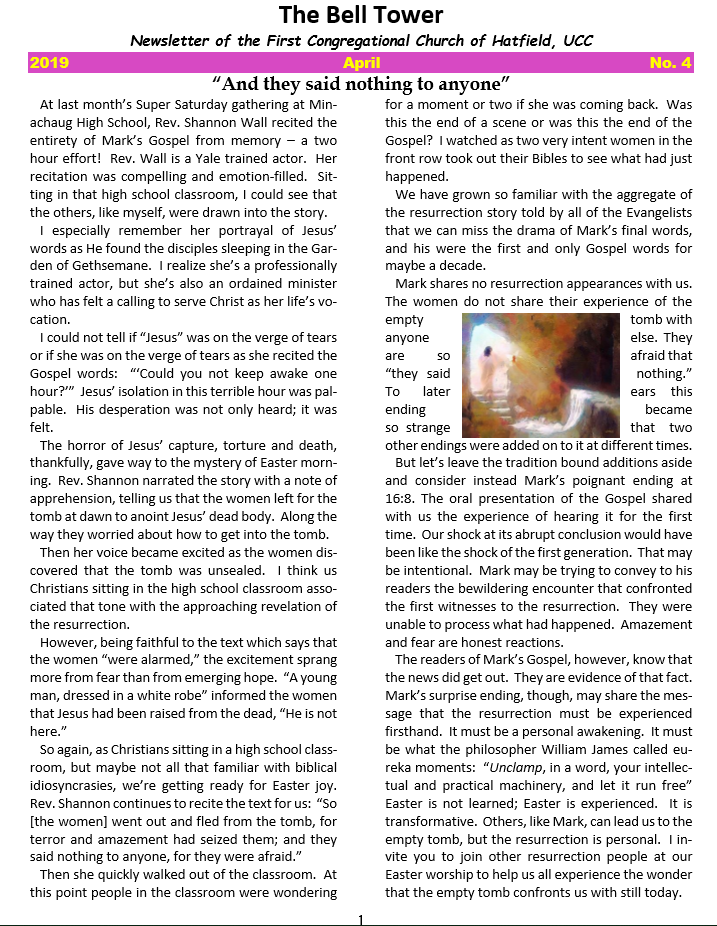
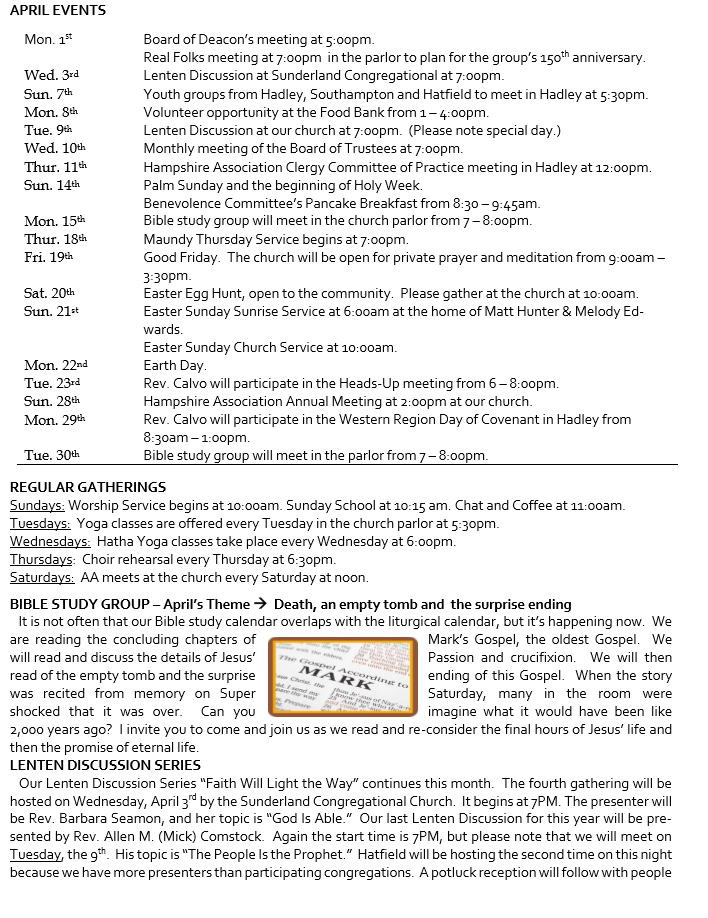
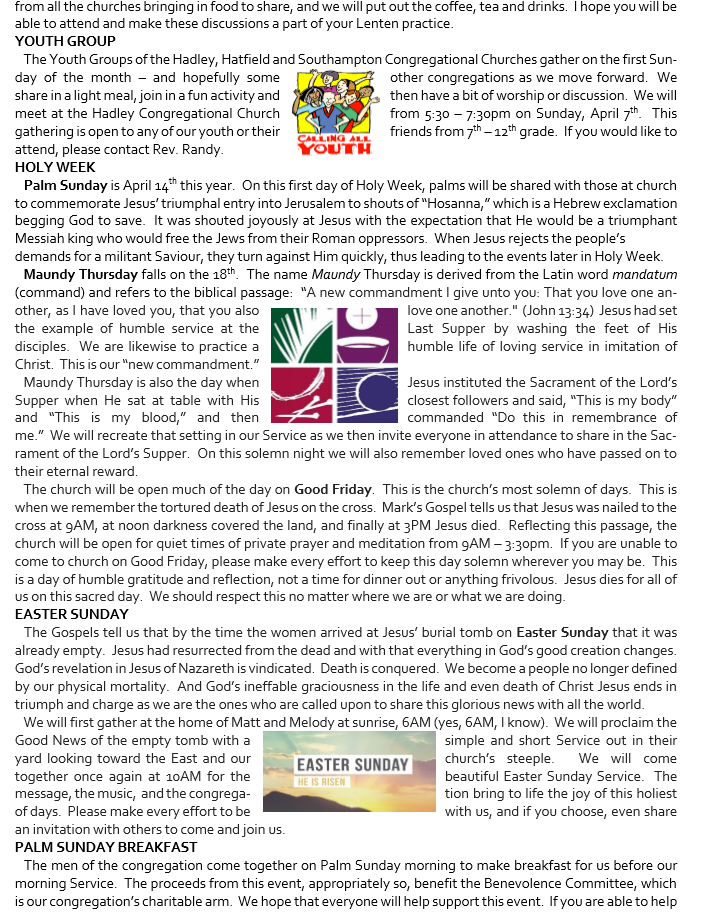
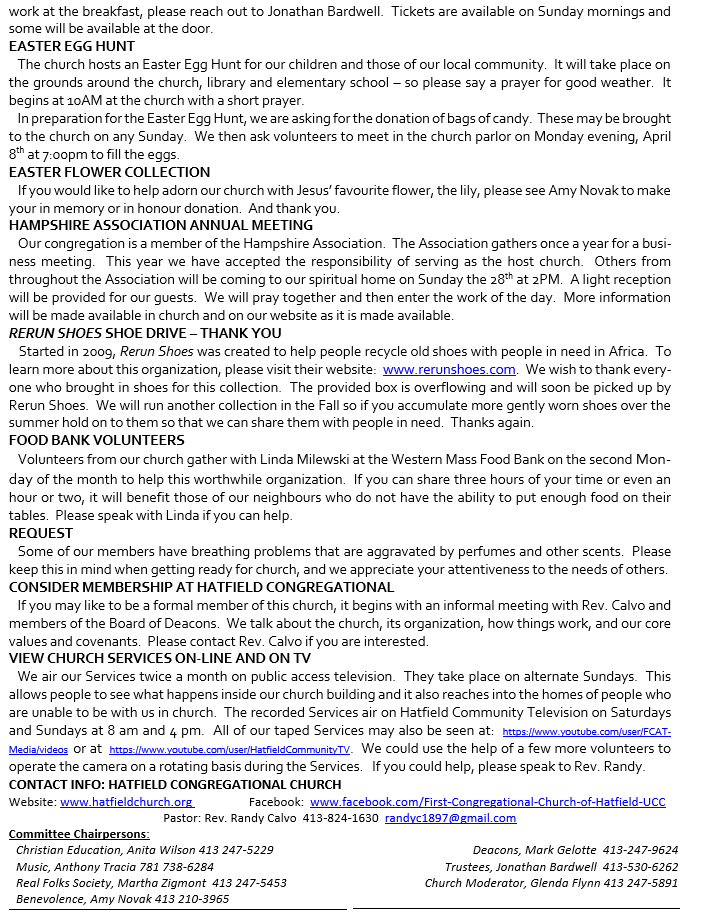






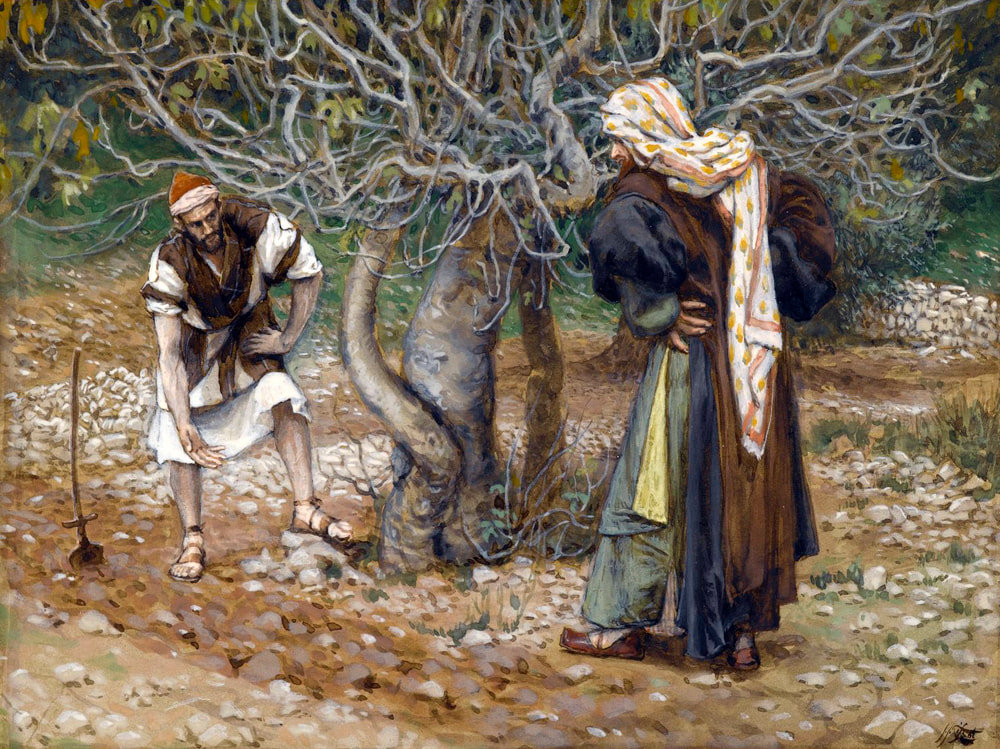



 RSS Feed
RSS Feed
